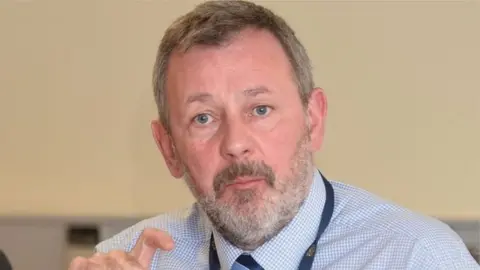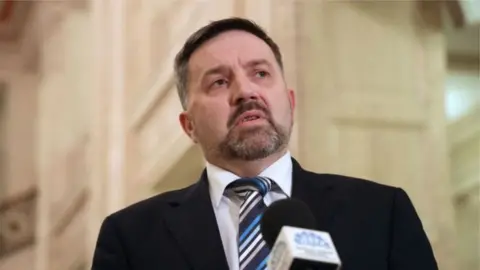Coronavirus: No hospital visits under NI Covid-19 surge plans
 PA
PAGeneral hospital visiting will end, with very limited exceptions, according to the next stage of health service plans to deal with the Covid-19 surge.
The Department of Health set out its plans on Thursday.
They include prioritising patient care, urgently discharging all medically fit patients and reconfiguring hospital services.
There have been 32 new confirmed cases of coronavirus and three more deaths.
It brings the total in Northern Ireland to 241 confirmed cases and 10 deaths.
The plans follow comments from Health Minister Robin Swann on Thursday that he does not "know what the health service will look like in a week's time".
On Wednesday, NI's chief medical officer briefed Stormont that there are many thousands of cases in Northern Ireland and that the virus is more widespread than statistics indicate.

- EASY STEPS: How to keep safe
- A SIMPLE GUIDE: What are the symptoms?
- CONTAINMENT: What it means to self-isolate
- HEALTH MYTHS: The fake advice you should ignore
- MAPS AND CHARTS: Visual guide to the outbreak
- VIDEO: The 20-second hand wash

As a result of the outbreak, NHS resources have been redirected to treating infected patients with many procedures and appointments cancelled.
The Royal College of Surgeons is now advising members that due to Covid-19 some surgeries will be treated differently to protect patients and staff, with some patients possibly being treated with antibiotics rather than surgery.
On Thursday, the Department of Health's Permanent Secretary Richard Pengelly outlined the health service surge plans in a letter to health trust chief executives.
The letter includes more measures to concentrate resources on essential patient care as well as for all spare capacity in residential, nursing and domiciliary care to be used.
Mr Pengelly said it was recognised that, in some cases, this could mean other services are temporarily reduced, as the focus is on providing essential services and helping those at risk access the best treatment.
 Pacemaker
Pacemaker"It is therefore suggested that clinicians should begin to categorise patients into priority groups," he added.
"The lowest prioritisation would be where treatment can be delayed for two to three months with no predicted negative outcome.
"Urgent and emergency treatments should continue to be given top priority."
The letter also addressed the provision of personal protection equipment (PPE), the supply of ventilators and other respiratory equipment, testing, and staff accommodation.
It states that staff affected by the 14-day household isolation policy should be offered - on an entirely voluntary basis - the alternative option of staying in hotel accommodation while they continue to work.
This should be organised locally by the trusts, it added.
 Pacemaker
PacemakerEarlier, Health Minister Robin Swann told Stormont's health committee that he could not give a commitment on when the health service would return to normal.
Mr Swann and the chief medical officer Michael McBride joined the meeting by Skype.
SDLP MLA Colin McGrath asked Mr Swann for reassurance that any service reconfiguration was “temporary” and that the health service would be “able to return to its former format".
The minister told him he was being “perfectly blunt” and that “I don’t know where we’ll be".
He explained that surge plans were in place, but that the health service was down to a number of procedures and elective surgeries that he would never have envisaged as health minister.
"To give any sort of commitment now that we will return 100% to where we were two months ago - I can't give it. I won't give it, because I can't stand over it," Mr Swann added.
Ventilators 'on their way'
Northern Ireland's chief medical officer Michael McBride also spoke to the committee and confirmed that testing will be increased next week to more than 1,100 tests a day, with plans to ramp that up at a national level in the coming weeks.
He said they need to ensure the quality control of testing kits obtained from the private sector.
Mr Swann also told the committee there are 650 ventilators "currently on their way at this minute in time" to Northern Ireland.
Meanwhile, Dr Laurence Dorman, from the Royal College of General Practitioners NI, told the committee that "GPs are frightened".
He added: "I am frightened, I am a father, a husband and I would not ask my GP colleagues to do something I would not do myself."
Dr Dorman was speaking about Covid centres, which are being set up across Northern Ireland as a means of assessing patients who may have coronavirus.
He said that the centres "are essential", would be located at "essential trust premises or out of hours" and will enable the "use of disinfecting procedures at scale".
